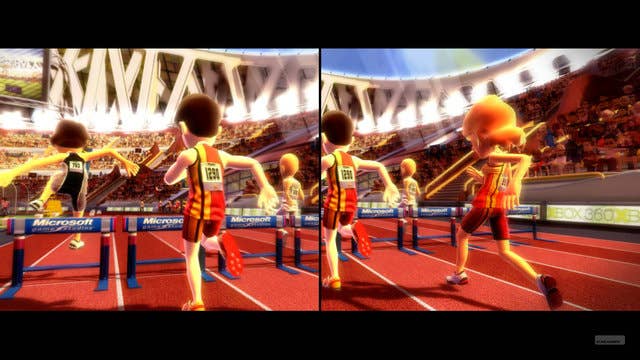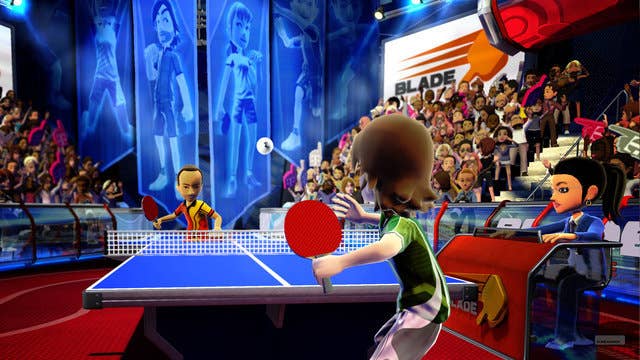Critical Consensus: Kinect Adventures, Sports and Kinectimals
Three of Kinect's launch titles laid bare
Kinect has launched in the US today, and with that launch review embargoes for the starting line-up have been lifted. Rather than attempt to digest the coverage of the entire launch line-up at once, here we'll look at three of the biggest games accompanying the hardware launch: Kinect Sports, Kinectimals and bundled title Kinect Adventures.
We've scoured the web for a broad perspective on the response to these three core games, and will be bringing you a more focused critical consensus piece on the actual hardware itself next week.
Kinect Adventures is a game which each and every Kinect owner will quickly become familiar with. Not only is it bundled with every Kinect sensor bar sold, it's also designed to be a learning tool to familiarise new audiences with Kinect's capabilities and nuances.
Generally, the consensus is that it does this job very well, providing an out-of-the-box experience which will be full of laughs coupled with a gentle learning curve which caters for even the most technophobic. It's not a game with a great deal of depth, though, and the limited number of activities means that regular play will soon see things grow repetitive.

"These mini-games are very easy to learn and they're fun at first, but they'll wear out quickly," says Ryan Clements at IGN in his 6.5/10 assessment.
"The most fun I had with Kinect Adventures is with Rallyball and Reflex Ridge. The other mini-games are entertaining for a short amount of time but they get old. This is actually the case with the entire Kinect Adventures experience, as each mini-game has a very limited appeal outside of the initial 'wow factor'," he continues.
"You'll be racing the same races, popping the same bubbles, and doing frustratingly simple activities. The problem is that the gameplay of Kinect Adventures just doesn't change over time. Once I played River Rush once or twice, every subsequent round felt identical. "
Eurogamer's Oli Welsh is of much the same mind, awarding a six to Adventures in a review which praises the innovation and implementation of what is essentially a tech demo come learning tool, whilst acknowledging a lack of lasting appeal.
"It's easy to see why show crowds and first-time users are reliably wowed by Adventures; it's original, cute, tailored to Kinect's unique capabilities, and impressively committed to the idea of full-body, real-time motion control on screen at all times.
"But with just five games it can ill afford one dud or sustain a laboured campaign mode, and without compelling multiplayer there's little reason to persevere with it after the wow factor wears off."
Over at GameInformer, Jeff Cork offers 7/10 for a title which he feels demonstrates the solidity and potential of the new hardware with some style.
"Kinect Adventures is exactly the kind of all-in, jump around experience that Microsoft must have envisioned for its Kinect peripheral. The game invites players to push the furniture out of the way, take off their serious gamer hats, and simply have a good time. As a pack-in title, it does a brilliant job of demonstrating what the tech can do," writes Cork.
"By now, most of us have played games that use glorified webcams, but they lack the precision and fidelity that Kinect offers. Being able to move around precisely in 3D space in Space Pop or 20,000 Leaks is incredible, and it speaks to the hardware's potential," he concludes.
Kinect Sports has been developed by Rare, and is, as much as Microsoft is loath to admit, Kinect's Wii Sports or Sports Champions. A collection of six sporting events, in addition to sixteen minigames based on those events, Kinect Sports is a chance to directly compare the effectiveness of Kinect technology with that of the Wii or Sony's Move.
"Both Kinect Sports and Sony's Sports Champions are transparent attempts to deliver a Wii Sports experience to their respective platforms," writes Eurogamer's Johnny Minkley, awarding a mark of 7/10.

"Both have seized upon and advanced the gameplay formula according to their strengths; but only Rare has understood the presentational lesson in Nintendo's success. "Enjoyment of Sports Champions is always in spite of its sterile, bargain-bin aesthetic. Rare's effort, in comparison, is an effervescent treat for the eyes and ears, bursting with charm, energy and flair."
But as showcase of potential for the technology, Sports disappoints Eurogamer, even highlighting the limited range of applications which the current raft of software employs.
"As a demonstration of the tech, it offers fleeting glimpses rather than a comprehensive examination of the potential of controller-free gameplay – with Kinect Adventures arguably offering superior examples. And it does little to answer questions on the hardware's application in core games further down the line.
"But as a lively, funny, polished and varied genre title that will slap a smile on the face of the most jaded cynic, Kinect Sports does its job admirably."
Gamespot's Justin Calvert is struck by the accessibility of Rare's Kinect offering in his 7.5/10 review, praising "intuitive and mostly responsive controls", whilst acknowledging that many actions require exaggeration in order to be registered properly.

"Your attempts to add spin to the ball aren't always recognized when you use a realistic motion, but exaggerating your movements so that the Kinect camera can more easily recognize them generally rectifies this problem," says Calvert of Sports' table-tennis game.
"Exaggerated movements are also recommended in boxing, incidentally, where your punches and blocks (you don't control anything else) can either be at head height or body height."
Calvert chooses bowling as the arena of comparison between Kinect, Move and the Wii, a comparison which suggests a parity of enjoyment, at least.
"Kinect doesn't afford you quite the same level of control over your ball's trajectory as the PlayStation Move does in similar games, but the speed of your throw is believable, and it's possible to add spin to the ball by bringing your arm across your body as you release the ball.
"Like the bowling in Wii Sports, this is bowling boiled down to the bare essentials, but the absence of different oil patterns and ball weights doesn't make it any less fun. It's a little jarring that you occasionally end up using a ball that's adorned with advertising, and it's unfortunate that no more than four of you can play together, but bowling is still a Kinect Sports highlight that you're likely to return to time and time again."

For IGN, it's the full body nature of Kinect's motion sensing which differentiates it from others. Arthur Gies writes:
"Kinect Sports is fundamentally different in practice than any video game you've probably played, including on the Wii or the PlayStation Move. The reason? Your feet. Where other sports collections have been exercises in moving your arms while standing in place, Kinect Sports requires real, physical movement, tracking your position within its active area while also monitoring exactly what your limbs - not just your arms - are doing."
Gies identifies a subtlety in many of Sports' controls that has gone unmentioned in some other coverage, giving credit to depth and nuance before awarding a healthy 8/10.
"Once I realized that minor changes in technique and style for kicks in soccer, or paddle technique in table tennis yield big results, Kinect Sports really clicked. I was lunging across a table that wasn't there to catch fast serves in table tennis, and bringing my arms down hard to spike a ball that never existed into virtual sand in volleyball. At its best, Kinect Sports sort of makes you forget it's there."
The last, and perhaps most interesting of our three round-up titles is interactive pet adventure Kinectimals. Touted by Alex Kipman as possessing Milo tech, which was quickly refuted by developing studio head David Braeburn, Kinectimals is simultaneously the most overtly family friendly and intriguing title at launch.

"Of all the Kinect launch titles, this is perhaps the one with the most actual substance. Hopefully it's but a hint of things to come," writes Keza MacDonald in conclusion to her 7/10 review at Eurogamer.
"Kinectimals actually does pretty much everything that the other launch titles do (alright, except Dance Central), and in a much more adorable way. Want to race a car with an imaginary steering wheel, like in Joy Ride?
"You can drive a remote control car around a track with a tiny tiger balancing on top of it. Want to flail your limbs at balls, like in Adventures' Rallyball? You can do that, too, playing kickball with a prancing baby cheetah," says Keza.
"You can knock over skittles and dominos by throwing things at them, feed giant frog mouths with tennis balls, kick footballs at targets and explore a surprisingly large, varied and beautiful fantasy island, all in the company of extremely cute, believable virtual animals. It's an adorable pet simulator, a charming adventure and a minigame collection, all in one, for the same price as all the other launch titles."
At Now Gamer, editor in chief Nick Jones overcomes his initial cynicism to award Kinectimals 8.1 out-of-ten, allowing a few caveats to dampen his enthusiasm a little.
"Core gamers beware. But Kinectimals is not a game for the 20-something Gears-lover, it's a game – in the large part – for people who don't play games."
Whilst lack of variety has proved to be a sticking point in the enjoyment of many assessments of Kinect titles so far, it's the insistent changes of pace in Kinectimals which Jones finds jarring.
"Our other gripe is with the way that Kinectimals pulls you from one game mode to another. It's like an insistent parent, dragging a child around a museum, stopping off for only a few seconds to view each exhibit: 'Right, we've seen the T-Rex, now onto the Crown Jewels!' it would say, if Kinectimals was an insistent parent, dragging you round our made-up museum that holds both dinosaur bones and the Queen's jewellery.
"Anyway, the point is: just as you're enjoying playing a game mode, you're interrupted and dragged off to try something else. It's annoying to say the least and almost as if Microsoft is so keen to show you its new technology, it has forgotten to let you just enjoy the game at the pace you want to enjoy it at."

Taking a different approach to the review is Joystiq's Justin McElroy, who admits defeat in the face of Kinectimal's child-friendly focus and employs a ten year old in his four-star review.
"As a grown, adult man, just four days shy of 30, Kinectimals is nigh incomprehensible to me," he writes – instead choosing to judge the considerable enjoyment which his ten year old sister-in-law Rileigh exhibits when playing.
"Rileigh's tiger (which she, naturally, named Dave) kicked things off by bringing her a whistle, which meant he wanted to learn to do some tricks. When she spun in circles, Dave did the same. When she lay on the floor, Dave played dead.
"Unfortunately, Dave didn't always follow commands to the letter, a complication that's tough to explain to a kid. I, of course, knew that Dave sometimes didn't do tricks because her skeleton wasn't in the right position, but I didn't want to freak the kid out about owning a tiger that could sense her bones. Either way, she didn't seem too bothered when she had to repeat tricks for Dave, so I let it go."
It's a sensible point to make, especially for a game which makes few bones about its intended audience. After all, as Jones concludes:
"You can judge Kinectimals all you want, but are you going to be the one who tells the little girl she can't have her own imaginary tiger"?
